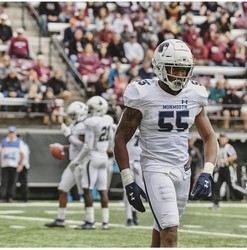One Student Discusses Importance of Diversity at University
 It is so close to graduation. As a senior, you look back at your years here and say, “Did I leave a legacy here? Did I make an impact on this community in West Long Branch, NJ?”
It is so close to graduation. As a senior, you look back at your years here and say, “Did I leave a legacy here? Did I make an impact on this community in West Long Branch, NJ?”
Personally, one of the things that find I myself looking for is the defining moment. What is that one experience that I have had that can define four years? I don’t know if it is possible, but there is one moment that I believe represents the things that I want to see changed here at MU.
Let me introduce a fact from collegeboard.com that I found interesting about the University.
Four percent of the students here at MU are black. Four percent seems like a small number, but when I saw two black students on the MU homepage when I was applying, I thought that the population percentage would in actuality be in the tens.
However, I am not voicing a gripe with the institution, but arguing a call to action for minority students who attend this university. Leave a legacy. And no, I am not referring to the bricks that you walk past every day on your way to class. Leave a legacy that people will remember for the rest of their lives.
Now what you all have been waiting for: the experience that I had that sums up my legacy here at MU. It happened last Friday. I was in story telling class with Professor Mary Carol Stunkel, and part of our class work requires us to go off campus and recite stories to children.
The school that we went to was the Hope Academy Charter School in Asbury Park, NJ. Last Friday, I told a story to a classroom full of excited second graders eager to hear what the visitor had to say, and it was a fulfilling experience. Seeing the children gasp when the man in the story disappeared or hearing their answers to why the person in the story was a selfish person did it for me.
The classroom was mixed with white children and children of color. But what left an indelible mark on my life is when the teacher approached me after I concluded my story and was exiting the classroom. She pulled me aside and said to me, “Out of all the years I had students from Monmouth University come to my classroom and tell stories to my students, you are the first person of color to do so. Not just black, of color.” That truly resonated with me because I can’t think of many things I was the first at doing, except being “me.” I was the first? It might not mean much to some people reading this, but I’m grateful that I could be the first person of color to represent MU in the classroom to those students.
For those of African descent who come after me and go on to represent MU in many ways, in your four years here, let us not be known by just how well we play sports or how athletic we are, let us be known for using our minds to impact this campus. Let us be reporters for The Outlook and presidents of clubs and outstanding academic students. Let us be the next group of professors tenured at this institution. Let us change our campus for the better because at the end of the day, all anyone wants to be is remembered.
No one wants to be forgotten, but more importantly, we need to show this campus and this community how our impact can be with the words we speak and the lives that we live. If we don’t prove it to ourselves as a community that we are worth more than our physical ability, then we have supremely undervalued our importance to this community.
It wasn’t solely Jackie Robinson’s or Muhammad Ali’s skills that caused them to be remembered as such integral components of black history, but it was what they stood for and said. MU desperately needs that and it starts with us.
IMAGE TAKEN from cte.umd.edu


